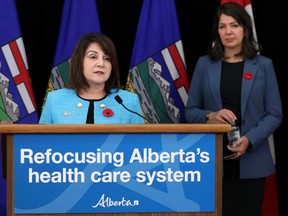
Article content
We’re growing numb to health-care headlines. Emergency rooms are over-capacity or temporarily closed. Surgery waits are up 57 per cent in Saskatchewan. The number waiting in Alberta is also rising. Surgery wait times can vary more than 200-fold for similar patients in Ontario. One in four Canadians has no family doctor, increasing their chances of a preventable death.
Advertisement 2
Article content
Why such a mess? Staff and physician shortages. No central waitlist for surgeries. Physicians are paid in ways that incentivize short visits; they set up shop wherever they want, and their work doesn’t always align with health-system objectives. Primary care is underfunded.
The root cause of these problems? No health-care plan that outlives the election cycle. Provincial health ministers come and go. Over the last 16 years, Alberta and Manitoba’s health ministers have lasted less than two years on average. Ontario’s lasted under three years. By the time they figure out what’s going on, they’re out. We need experienced health-care leaders to create and implement long-term plans, sheltered from the whims of politics.
All provinces need a primary-care organization to oversee the major changes needed, working closely with physicians and the organizations that run hospitals. Alberta will be the first when theirs launches this fall, but with few details and without a new funding model for family physicians, it could be a rocky start. These structures should be independent from the minister, and must focus on integrating all parts of the system.
Article content
Advertisement 3
Article content
Integration is a hallmark of high-performing health-care systems. Patients and health information move seamlessly between clinicians. Your family physician creates a plan for your care with you. It lives in the electronic health record, accessed by your specialists, the hospital, all your clinicians, and by you. Everyone works on the shared plan together.
We’re nowhere near this. In 2023, one in five Canadians received conflicting information from different clinicians. One in seven saw a specialist who didn’t have basic medical information from the referring doctor. One in five people in hospital were discharged without follow-up care.
Health ministers choose flashy announcements over major improvements. Manitoba is asking for input on three design options for their plastic health-care cards. They added a few hospital beds and doctors and reimbursed doctors’ licensing fees (not enough to attract new doctors). Nova Scotia opened a new endoscopy suite. Alberta is threatening to remove Alberta Health Services as the operator of some rural hospitals, turning them over to the province’s Catholic health-care provider.
Advertisement 4
Article content
Health ministers recruit foreign workers and physicians rather than expanding training capacity here. This would ensure a steady supply of the right type of clinicians, but not for three to five years — just in time for the next government to take credit.
With one eye on re-election, health ministers shy away from tough decisions. For decades, family doctors have demanded an organized way of referring patients to specialists. How can they know whose waitlist is shortest or who operates on shoulders, not hips? Some specialties, within some areas of some provinces have central referral and triage. That’s where your family doctor sends referrals to the local group of specialists, not a specific one. As a team, the specialists determine urgency, who can best help you, and who has the shortest waitlist. Why wait a year, when you could see someone else next month?
Many specialist groups across Canada simply refuse to participate. The current system works, for them. Consults in their drawer are a rainy-day fund. Plus, triaging is time-consuming and isn’t paid under a fee-for-service system. If someone was looking at the whole system, this would be an obvious fix.
Advertisement 5
Article content
But addressing the crucial issues in health care will make some groups, like doctors, livid. Physicians like being their own boss, deciding how, and how much, they work and earn. Governments avoid the fight.
Instead, they reshuffle org charts, announce private surgical clinics, nurse practitioner clinics, new fees for doctors or pharmacists. Without considering how these changes affect integration of the broader system, they cause problems elsewhere in the system. Waitlists get longer, more unfair. Your care suffers.
It’s killing Canadians.
Health ministers will still have critical roles, setting budgets and priorities and holding health-care leaders accountable for meeting them. But the most important next step politicians should take is to isolate the health-care system from themselves.
Braden Manns is a physician and professor of Medicine and Health Economics at the University of Calgary. He was an interim vice-president for Alberta Health Services until he resigned on June 11, 2023.
Article content

